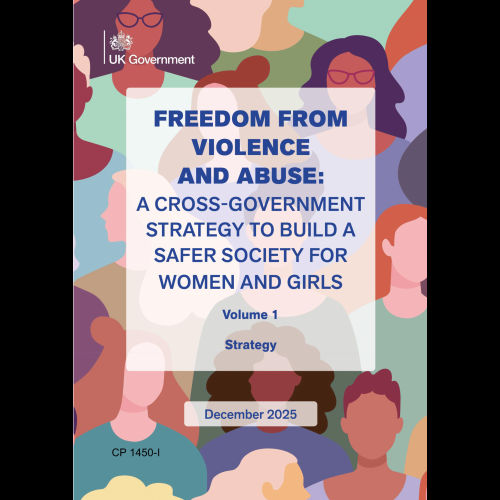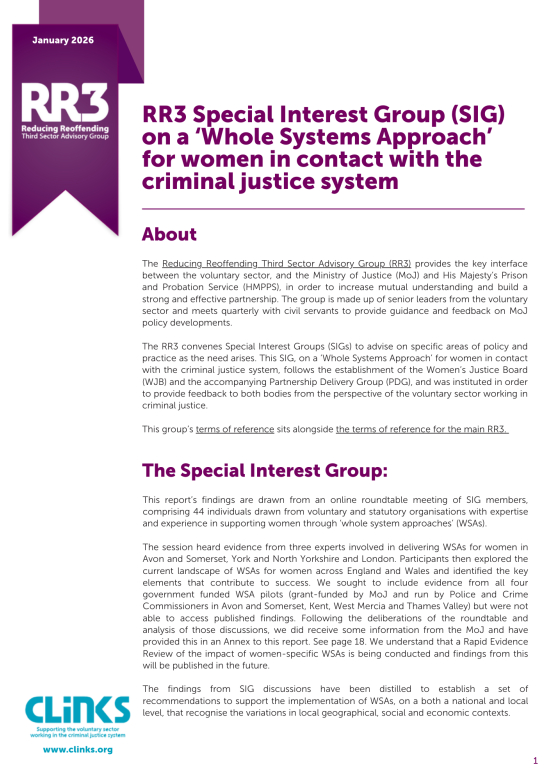Today I will be giving evidence to the Justice Select Committee’s inquiry into the future of the probation service. Clinks has already submitted written evidence to the committee which you can read here. This is based on feedback from a wide range of organisations across the voluntary sector and raises many of the issues highlighted in my last blog including the voluntary sector’s concerns on the complexity of the commissioning, the need for costly IT infrastructure and for credit reports not suited to illustrating the financial health of voluntary sector organisations. In my last blog I also highlighted ongoing questions around the contract values and the predicted number of services users these are based upon.
As transition towards the new model progresses and now that we are half way through the competition process for the commissioning of services to be up and running alongside the National Probation Service (NPS) from day one of the new model (Education Training and Employment (ETE), Accommodation, Personal Wellbeing and Women’s Centred Services), I will be reflecting to the Justice Committee Clinks’ views on whether the model offers sufficient opportunity for voluntary sector organisations.
Is there sufficient resource and opportunity for the voluntary sector?
Overall HM Prison and Probation Service (HMPPS) is investing a significant amount of money, probably more than ever before, in the kinds of services that our sector has the expertise and experience in providing. By year three and four of the new model onwards it is forecast that £120m will be spent annually on resettlement and rehabilitation services.
Although the total overall investment that will be made in future years is sizeable, not all services that can be commissioned through the Dynamic Framework in the future are being commissioned to be in operation from day one of the new model. This means that in the early months the amount spent on commissioned services will be considerably less and there are only opportunities for some parts of the voluntary sector.
That said the investment in year one is still greater than Community Rehabilitation Company (CRC) data indicates is currently spent annually on resettlement and rehabilitation services. However, the contract values also need to cover more than just service delivery with substantial requirements around having offices in certain locations where services can be based, IT infrastructure and also the need to be able to cover future pension liabilities for staff transferring from CRCs.
Organisations are feeding back to us that for the competitions that have gone live so far, these requirements mean they are having to shave service delivery to the bone, have limited ability to involve the range of partners they would like and are sometimes struggling to make contracts break even.
We have also heard that as a result of this, some larger providers including private primes, are looking to the multi service contracts of personal wellbeing and women’s services as more likely to represent opportunities for economies of scale. This could have a negative impact on the ability of small specialist organisations to compete for these contracts.
Cancellation of Probation Delivery Partner contracts
The cancellation of the Probation Delivery Partner Contracts for the delivery of unpaid work and accredited programmes raised some concerns in the sector that less investment would flow to charities. In reality, the cancellation of these contracts makes little difference to the majority of the small and specialist organisations in the voluntary sector who would have been unable to bid for contracts of that size. Some have questioned how the funds for those contracts will now be spent - but HMPPS is clear that these will now be utilised in service delivery by the NPS and that there was little additional resource for contract management.
One potential implication of this, is that the larger organisations who had seen an opportunity in these contracts are now more likely to be competing with small and specialist organisations for the opportunities presented by the Dynamic Framework.
Is the sector able to engage with the commissioning process?
The issues regarding the complexity of the commissioning process raised in my previous blog remain, and present a significant challenge to the sector. At the end of August over 370 organisations had registered interest in the Dynamic Framework. Over 150 organisations had completed Selection Questionnaires (the supplier qualification form) and at least 60% of those were voluntary organisations. Over 70 of those 150 had already qualified onto the Dynamic Framework. These numbers represent a small proportion of the 1700 organisations estimated to be in the sector, two thirds of which work with people under probation supervision.
As with everything, the complexity of the commissioning has been impacted by the Covid-19 pandemic, which has meant that both the Ministry of Justice (MoJ) and the voluntary sector are engaging in a complex commissioning process with reduced resources and in a reduced period of time.
At the first meeting of the Reducing Reoffending Third Sector Advisory Group (RR3) Probation Special Interest Group, members recommended that for the sector to engage in commissioning at this time all information should be clearly available at the beginning of any call off. However, this has not been the case and voluntary sector organisations are having to individually ask huge numbers of clarification questions. At Clinks we find ourselves not just influencing on overarching policy issues but having to understand and question significant details of the contracts.
Do the proposed services meet need?
Covid-19 has also reduced HMPPS and MoJ resources in such a way that they had to take the decision to commission less services for day one, leaving out Alcohol and Dependency and Finance, Benefit and Debt. For the remaining day one services the competition was restructured to commission Accommodation and ETE across regional probation areas rather than Police and Crime Commissioner (PCC) areas. This has further reduced the day one opportunities for the sector overall and as the Accommodation and ETE contracts are larger, there is less scope for the involvement of smaller organisations with more local footprints or delivering specialist services to certain cohorts. These organisations can now only get involved in the delivery of these contracts through partnerships and sub-contracting.
As well as commissioning a more limited set of services for day one, the service specifications in each of the categories are different to that which are currently commissioned by CRCs. There are substantial changes to the Through the Gate model which means that the sector will likely be delivering a more limited amount of pre-release support. This has raised concerns that the learning and benefits of the current Enhanced Through the Gate model which allow for collaboration and closer working between the voluntary sector, CRCs and prisons will be lost.
There is also an assumption inherent in the commissioning model that services will take a while to ramp up and as such the number of service users would be lower in the first couple of years than in later years. Given the needs the voluntary sector knows to exist amongst people under probation supervision, this does not make sense. In part as a result of Clinks and RR3 influencing, these issues have been addressed in the accommodation contract.
We are also engaged in ongoing discussions to understand the contract values for women’s services. As multi service contracts there is added complexity in ensuring it is costed appropriately given that an individual woman may have multiple co-occuring needs that the service will be required to address.
Raising our concerns with HMPPS
We have raised these issues with Amy Rees, Director General of Probation at HMPPS and the probation reform team have engaged positively with us in trying to mitigate these issues. We are currently exploring with them options for providing support to organisations around the IT requirements of the contracts and we hope that we might see the remaining call offs address some of our other concerns.
We hope that this will mean that the forthcoming competition for personal wellbeing and women’s services will avoid some of the challenges around contract value that we have seen with accommodation and ETE, however we are concerned that the questions around estates, and Transfer of Undertakings (Protection of Employment) Regulations (TUPE) liabilities will remain. In addition, the challenges around the complexity and structure of the commissioning model are to a large extent challenges with the cross-government procurement model than with policy choices made by the probation reform team.
Conclusion
We continue to be concerned that despite the increased investment in rehabilitation and resettlement services presented by the new model, the contracts for day one services do not provide significant enough opportunity for the voluntary sector. Where the voluntary sector is successful in the procurements, they may find themselves subsiding contracts in order to deliver quality of service, just as our research found is the case with current Transforming Rehabilitation contracts. We may also have to wait some time before Regional Probation Directors feel the NPS is sufficiently established to turn their attention to commissioning services for day two and beyond. All this threatens the sustainability of the criminal justice voluntary sector and is brought into sharper focus when we consider the impact of Covid-19.
Clinks wholeheartedly believes, that the probation service needs the expertise and experience of the voluntary sector to achieve improved outcomes for the people under its supervision and the communities they live in. For this reason I’ll be raising these issues in my evidence to the Justice Committee this afternoon and we will continue to highlight our concerns with the probation reform team as well as HMPPS, MoJ and the government more widely so that the voluntary sector is able to continue to work alongside probation and across the wider criminal justice system.
What's new
Blogs
Violence Against Women and Girls (VAWG) Strategy Blog
Publications
RR3 Special Interest Group (SIG) on a ‘Whole Systems Approach’ for women in contact with the criminal justice system
The RR3 SIG drives a Whole Systems Ap
Latest on X
The role is for a leader from an organisation focused on racially minoritised people, with expertise in service delivery, policy, advocacy, or related areas in criminal justice. Racial disparities are present at every CJS stage. This role ensures these voices are central in shaping policy to help address and eradicate them. Apply by Mon 18 Nov, 10am. More info: https://www.clinks.org/voluntary-community-sector/vacancies/15566 #CriminalJustice #RR3 #RacialEquity

